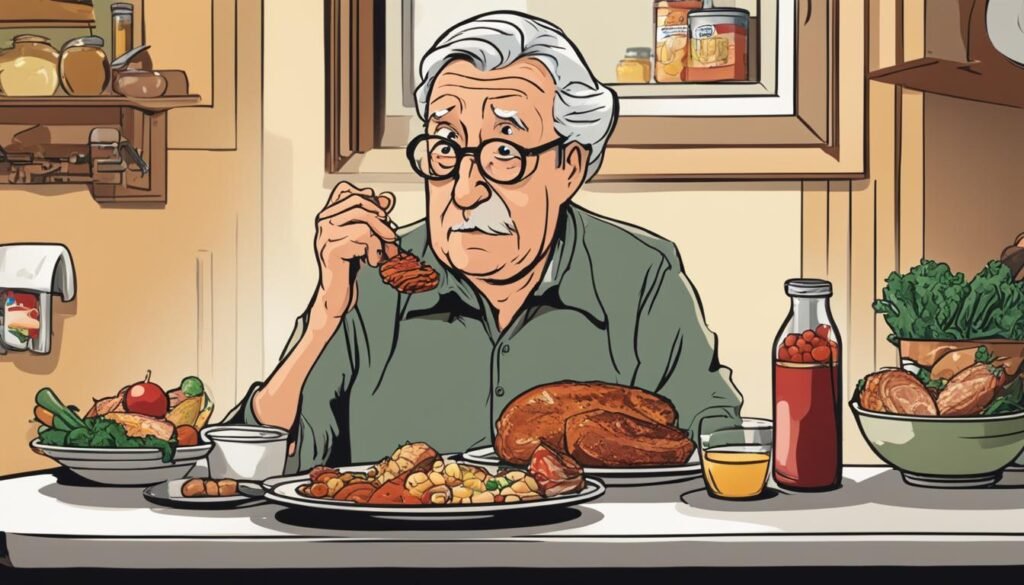Vitamins and minerals are essential nutrients that seniors need to maintain their health and well-being. By understanding the specific vitamins and minerals recommended for older adults, seniors can ensure they are getting the right amount through their diet or supplements. The Dietary Guidelines provide guidance on the recommended intake of vitamins and minerals for seniors, and it is important to consult with a healthcare professional for personalized advice.
Key Takeaways:
- Seniors’ nutrient needs include essential vitamins and minerals for maintaining their health.
- Consult with a healthcare professional to determine the recommended intake of vitamins and minerals.
- Obtain nutrients through a balanced diet or consider supplements if necessary.
- Ensure the safe use of supplements by choosing reputable brands and consulting with a healthcare professional.
- Sodium intake should be moderated to reduce the risk of high blood pressure.
The Importance of Vitamins for Seniors
Vitamins play a crucial role in seniors’ overall health and well-being. As we age, our bodies may have a harder time absorbing and utilizing nutrients, making it essential for seniors to pay extra attention to their vitamin intake. There are 13 essential vitamins that the body needs, including vitamins A, C, D, E, K, and the B vitamins.
Vitamin A, for example, supports immune function and helps maintain healthy vision. Vitamin C is known for its antioxidant properties and supports the immune system. Vitamin D aids in calcium absorption, which is important for maintaining strong bones. Vitamin E is an antioxidant that helps protect cells from damage. And the B vitamins, including B1, B2, B3, B6, and B12, play various roles in promoting energy production, supporting nerve function, and maintaining brain health.
To ensure they are getting the recommended amount of vitamins, seniors should focus on consuming a balanced diet that includes a variety of nutrient-dense foods. Incorporating fruits, vegetables, whole grains, lean proteins, and low-fat dairy products can help provide the necessary vitamins and other essential nutrients. If needed, a healthcare professional or registered dietitian can provide personalized guidance on meeting vitamin needs through diet or supplements.

The Role of Vitamin D in Seniors’ Health
Vitamin D is particularly important for seniors as it plays a vital role in bone health. It helps the body absorb calcium and promotes the proper functioning of muscles and nerves. Seniors are at a higher risk of vitamin D deficiency due to factors such as decreased sun exposure and decreased ability to convert sunlight into vitamin D.
Food sources of vitamin D include fatty fish like salmon and mackerel, fortified dairy products, and egg yolks. However, it can be challenging to obtain sufficient vitamin D through diet alone, especially for seniors who have limited exposure to sunlight. In such cases, a vitamin D supplement may be necessary to ensure adequate intake. Consulting with a healthcare professional can help determine the right dosage and form of vitamin D supplement for individual needs.
Meeting Vitamin Needs With a Balanced Diet
While supplements can be beneficial, it is generally recommended to obtain vitamins and minerals from food sources whenever possible. Nutrient-dense foods not only provide essential vitamins but also other beneficial components like fiber. For seniors, a well-balanced diet that includes a variety of fruits, vegetables, whole grains, lean proteins, and low-fat dairy products can help meet their nutritional needs.
By focusing on a diverse range of foods, seniors can ensure they are getting the essential vitamins they need for optimal health and well-being. However, it’s always important to consult with a healthcare professional or registered dietitian to determine the best approach based on individual needs and health conditions.
Recommended Minerals for Older Adults
Alongside vitamins, minerals are essential for maintaining the health of older adults. These micronutrients serve various functions in the body and play a crucial role in supporting overall well-being. Seniors should ensure they are obtaining recommended minerals through a balanced diet that includes a diverse range of nutrient-rich foods.
Here are some key minerals that are particularly important for older adults:
- Calcium: Calcium is essential for maintaining strong bones and teeth. Good sources of calcium include dairy products, leafy green vegetables, and fortified plant-based milk.
- Magnesium: Magnesium plays a role in nerve and muscle function, as well as maintaining a healthy immune system. It can be found in foods like whole grains, nuts, seeds, and legumes.
- Potassium: Potassium is important for heart health and helps regulate blood pressure. Foods like bananas, citrus fruits, potatoes, and leafy greens are rich in potassium.
Other minerals that seniors should include in their diet include iron, zinc, selenium, and copper. These minerals are involved in various bodily processes and can be obtained from sources like lean meats, seafood, whole grains, and nuts.
| Mineral | Recommended Daily Intake | Main Food Sources |
|---|---|---|
| Calcium | 1,200 mg | Milk, yogurt, cheese, leafy greens |
| Magnesium | 420 mg (males), 320 mg (females) | Whole grains, nuts, seeds, legumes |
| Potassium | 2,600-3,200 mg | Bananas, citrus fruits, potatoes, leafy greens |
| Iron | 8 mg (males), 18 mg (females) | Lean meats, seafood, beans, fortified cereals |
| Zinc | 11 mg (males), 8 mg (females) | Meat, shellfish, legumes, nuts, whole grains |
| Selenium | 55 mcg | Seafood, meat, whole grains, nuts |
| Copper | 900 mcg | Organ meats, shellfish, nuts, seeds, whole grains |
It is important to note that individual mineral needs may vary depending on factors such as age, gender, and underlying health conditions. Consulting with a healthcare professional or registered dietitian can provide personalized advice on meeting mineral requirements and maintaining optimal health in the senior years.
Meeting Vitamin and Mineral Needs Through Food
When it comes to meeting the vitamin and mineral needs of seniors, a well-balanced diet is essential. Nutrient-dense foods not only provide the necessary vitamins and minerals but also offer other health benefits such as fiber. While supplements can be helpful in bridging any nutrient gaps, it is generally recommended to obtain these essential nutrients from food sources.
Vitamin-rich foods that seniors should include in their diet are:
- Citrus fruits like oranges and grapefruits, which are high in vitamin C
- Dairy products like milk and yogurt, which are good sources of calcium and vitamin D
- Leafy greens such as spinach and kale, which provide vitamins A, C, and K
Minerals like calcium, magnesium, and potassium can be obtained from sources such as:
- Dairy products like milk and cheese
- Legumes like beans and lentils
- Nuts and seeds
By incorporating a variety of fruits, vegetables, whole grains, lean proteins, and low-fat dairy products into their diet, seniors can ensure they are getting the necessary vitamins and minerals for maintaining their health and promoting healthy aging.

| Food Source | Vitamins | Minerals |
|---|---|---|
| Oranges | Vitamin C | – |
| Milk | Vitamin D, Calcium | – |
| Spinach | Vitamin A, C, K | – |
| Cheese | – | Calcium |
| Beans | – | Magnesium, Potassium |
| Nuts and Seeds | – | Magnesium, Potassium |
Considerations for Taking Dietary Supplements
When it comes to seniors’ vitamin and mineral intake, dietary supplements can be a valuable resource. However, it’s important to approach them with caution and make informed decisions. Consulting with a healthcare professional is essential before starting any new supplement regimen, as individual needs may vary. Here are some key considerations to keep in mind:
1. Safety and Suitability
Not all supplements are created equal, and it’s crucial to choose reputable brands that meet quality standards. Look for supplements that contain the necessary vitamins or minerals without unnecessary additives. Additionally, consider any existing health conditions, medications, or allergies when selecting a supplement, taking into account potential interactions or contraindications.
2. Right Dosage and Quality
It’s important to follow the recommended dosage guidelines provided by healthcare professionals or the supplement manufacturer. Taking excessive amounts of certain nutrients can have adverse effects on health. Quality control and manufacturing processes should also be considered to ensure the supplement’s efficacy and safety.
“Supplements can provide additional support for maintaining health in seniors, but it’s essential to approach them with knowledge and caution, consulting healthcare professionals for guidance.” – Dr. Jane Adams
3. Monitoring and Regular Evaluation
Regular monitoring and evaluation of the supplement’s effectiveness is crucial. It’s recommended to keep track of any changes in health, well-being, or symptoms while taking supplements. If there are no noticeable improvements or if new symptoms arise, consulting a healthcare professional is important to reassess the supplement’s suitability and adjust the regimen if necessary.
| Supplement Considerations | Benefits | Risks |
|---|---|---|
| Consultation with Healthcare Professional | – Personalized guidance – Safety and suitability assessment |
– Potential interactions – Allergy or side effects |
| Choosing Reputable Brands | – Quality assurance – Consistent dosage |
– Contamination – Poor manufacturing |
| Monitoring and Evaluation | – Assessing effectiveness – Adjusting dosage if necessary |
– Adverse effects over time – No noticeable improvements |
Sodium Intake for Older Adults
Sodium is an important mineral that needs to be consumed in moderation by older adults. High sodium intake can increase the risk of high blood pressure, which can lead to heart disease and stroke. It is crucial for seniors to be aware of the recommended sodium intake and take steps to lower their sodium consumption.
The recommended sodium intake for people aged 51 and older is 2,300 mg per day, with a further reduction to 1,500 mg per day for those with high blood pressure or prehypertension. This means that seniors should aim to limit their sodium intake to these levels to maintain their health and well-being.
Seniors can lower their sodium intake by adopting healthy eating habits. Cooking at home allows them to have control over the amount of sodium used in their meals. Avoiding processed foods, which are often high in sodium, can also help reduce sodium intake. Instead of relying on salt for flavoring, seniors can use herbs and spices to enhance the taste of their dishes.

By being mindful of their sodium intake and making conscious food choices, older adults can take proactive steps to maintain their health and reduce their risk of high blood pressure and related diseases. It is important for seniors to prioritize their nutrition and consult with a healthcare professional or registered dietitian for personalized guidance on meeting their sodium and overall nutritional needs.
Specific Vitamin and Mineral Recommendations for Older Adults
As older adults age, their nutritional needs change, and it becomes essential to ensure they are getting the right vitamins and minerals to maintain their health. The Dietary Guidelines provide specific recommendations for seniors, outlining the daily intake levels for various vitamins and minerals. Let’s take a closer look at some of these recommendations:
Vitamins:
The recommended daily intake of vitamin A for older adults is 900 micrograms for men and 700 micrograms for women. Vitamin A plays a crucial role in maintaining vision, immune function, and cell growth.
Vitamin C, an antioxidant vitamin, is recommended at 90 milligrams for men and 75 milligrams for women per day. It helps support immune function, collagen production, and the absorption of iron.
Vitamin D is essential for bone health, as it helps the body absorb calcium. The recommended intake for adults aged 70 and older is 800 international units (IU) per day.
Minerals:
Calcium is necessary for maintaining bone health, and adults aged 51 and older should aim for 1,200 milligrams per day.
Magnesium, involved in over 300 biochemical reactions, supports muscle and nerve function. The daily recommended intake for men is 420 milligrams, while women should aim for 320 milligrams.
Potassium is important for maintaining healthy blood pressure and is found in foods like bananas, spinach, and sweet potatoes. The daily recommendation for adults is 2,600-3,400 milligrams.
These are just a few examples of the specific vitamin and mineral recommendations for older adults. It is important to note that individual needs may vary based on factors such as gender, health status, and activity level. Consulting with a healthcare professional can provide personalized guidance on meeting these recommendations and ensuring optimal health in the senior years.
| Vitamins | Recommended Intake |
|---|---|
| Vitamin A | 900 micrograms for men 700 micrograms for women |
| Vitamin C | 90 milligrams for men 75 milligrams for women |
| Vitamin D | 800 IU |
| Minerals | Recommended Intake |
|---|---|
| Calcium | 1,200 milligrams |
| Magnesium | 420 milligrams for men 320 milligrams for women |
| Potassium | 2,600-3,400 milligrams |

Food Sources of Vitamins and Minerals for Seniors
Seniors can ensure they are getting the necessary vitamins and minerals by including a variety of nutrient-rich foods in their diet. Here are some examples of food sources for essential vitamins and minerals:
- Vitamin A: Eggs, milk, and vegetables like carrots and mangoes
- Vitamin B complex: Meat, fish, whole grains, and fortified products
- Vitamin C: Citrus fruits, tomatoes, and potatoes
- Calcium: Dairy products, tofu, and leafy green vegetables
- Magnesium: Nuts, seeds, legumes, and whole grains
- Potassium: Bananas, avocados, spinach, and potatoes
- Iron: Red meat, poultry, seafood, beans, and fortified cereals
These are just a few examples. Seniors should aim for a well-rounded diet that includes a variety of fruits, vegetables, whole grains, lean proteins, and low-fat dairy products to meet their nutritional needs.
“A balanced diet that includes a variety of nutrient-rich foods is the best way for seniors to obtain the necessary vitamins and minerals for optimal health.”
Benefits of Food Sources
Obtaining vitamins and minerals from food sources rather than supplements offers several benefits. First, nutrient-dense foods also provide other beneficial components like fiber, antioxidants, and phytochemicals, which can contribute to overall health. Second, foods are often more easily absorbed and utilized by the body compared to synthetic supplements. Lastly, a diet rich in whole foods provides a wide range of nutrients that work synergistically to support health and well-being.
Consult a Healthcare Professional
While a balanced diet can meet the nutritional needs of most seniors, there may be cases where supplements are necessary to bridge any nutrient gaps. It is important for seniors to consult with a healthcare professional or registered dietitian to determine if supplements are needed and to receive personalized guidance on meeting their specific nutritional needs.
Benefits and Risks of Dietary Supplements for Seniors
As seniors age, their nutritional needs may change, leading many to consider dietary supplements to support their health. While supplements can offer potential benefits, it is important to understand the risks associated with their use. Here, we will explore the benefits and risks of dietary supplements for seniors, helping you make informed decisions about your nutritional intake.
Potential Benefits of Dietary Supplements
For seniors, dietary supplements can serve as a convenient way to fill nutrient gaps and support overall health. They can provide the necessary vitamins and minerals that may be lacking in a person’s diet, ensuring that they meet their recommended daily intake. Additionally, certain supplements may offer specific health benefits. For example, omega-3 fatty acid supplements have been shown to support heart health, while calcium and vitamin D supplements can help maintain strong bones and reduce the risk of osteoporosis.
“Dietary supplements can provide essential nutrients that may be lacking in a person’s diet, contributing to overall health and well-being.”
Risks and Considerations
While dietary supplements can be beneficial, it is crucial to approach their use with caution. Some supplements may have potential risks and side effects, especially when taken in excessive amounts or in combination with certain medications. It is important to consult with a healthcare professional before starting any new supplement regimen to ensure it is safe and appropriate for your individual needs. Additionally, not all supplements on the market are regulated by the FDA, so it is important to choose reputable brands and products.
Conclusion
When used appropriately, dietary supplements can be a valuable addition to a senior’s nutrition regimen, helping them meet their nutrient needs and maintain overall health. However, it is essential to consider the potential risks and consult with a healthcare professional for personalized advice. By making informed decisions about dietary supplements, seniors can support their well-being and enjoy a healthy and fulfilling life.
Recommendations for Herbal Supplements for Seniors
When it comes to herbal supplements for seniors, it is important to approach them with caution and consult with a healthcare professional before starting any new regimen. While some herbal supplements may offer potential health benefits, their safety, efficacy, and interactions with medications are often not well-established. Seniors should prioritize their safety and well-being by seeking professional guidance before incorporating herbal supplements into their healthcare routine.
Herbal supplements are dietary supplements derived from plants, and they can come in various forms such as capsules, tablets, or extracts. Some commonly used herbal supplements by seniors include ginkgo biloba, turmeric, garlic, and echinacea. However, it is important to note that the use of herbal supplements may carry some risks, especially for older adults who may have underlying health conditions or take multiple medications.
Interactions between herbal supplements and prescription drugs can be a concern, as some herbal supplements may interfere with the effectiveness or safety of certain medications. For example, St. John’s Wort, a popular herbal supplement used for depression, can reduce the efficacy of certain medications, including blood thinners and antidepressants. It is crucial for seniors to inform their healthcare professionals about any herbal supplements they are taking to avoid potential interactions or adverse effects.
Ultimately, the decision to use herbal supplements should be made in consultation with a healthcare professional who can assess the individual’s specific health needs, medication profile, and potential risks. Healthcare professionals can provide personalized advice on whether a specific herbal supplement is safe and appropriate for seniors, ensuring that their health and well-being are prioritized.
Conclusion
Meeting the recommended intake of vitamins and minerals is crucial for maintaining the health of seniors. These essential nutrients play a significant role in their overall well-being and can help support healthy aging. While it is generally advised to obtain vitamins and minerals through a well-balanced diet, supplements may be necessary for some individuals to ensure they meet their nutritional needs.
Consulting with a healthcare professional or registered dietitian is essential in determining the specific requirements of seniors and providing personalized guidance. They can assess any nutrient gaps and recommend appropriate supplements if needed. This professional advice can help seniors optimize their health and well-being in their golden years.
By prioritizing seniors’ vitamin and mineral intake and incorporating the right supplements when necessary, we can support their overall health and help them lead vibrant and fulfilling lives. Remember, it is always best to consult with a healthcare professional for personalized guidance and ensure that seniors receive the nutritional support they need for maintaining optimal health.
FAQ
What are the essential vitamins that seniors need?
Seniors need vitamins A, C, D, E, K, and the B vitamins.
What functions do these vitamins serve?
These vitamins support immune function, maintain healthy nerves, and provide energy.
How can seniors obtain the recommended amount of vitamins?
Seniors can obtain the recommended amount of vitamins through a balanced diet that includes a variety of nutrient-dense foods.
What minerals are important for seniors’ health?
Important minerals for seniors include calcium, magnesium, potassium, sodium, and more.
How can seniors obtain these minerals?
Seniors can obtain minerals from a well-rounded diet that includes foods like dairy products, leafy green vegetables, whole grains, and lean meats.
Is it better to obtain vitamins and minerals from food or supplements?
It is generally recommended to obtain vitamins and minerals from food, as nutrient-dense foods also provide other beneficial components like fiber.
When might seniors need to take supplements?
Some seniors may require supplements to bridge any nutrient gaps. Consulting with a healthcare professional or registered dietitian can help determine if supplements are necessary.
What should seniors consider when taking supplements?
Seniors should consult with a healthcare professional before starting any dietary supplement to ensure it is safe and appropriate for individual needs. They should also choose reputable brands without unnecessary additives.
How much sodium should seniors consume?
The recommended sodium intake for people aged 51 and older is 2,300 mg per day, with a further reduction to 1,500 mg per day for those with high blood pressure or prehypertension.
How can seniors lower their sodium intake?
Seniors can lower their sodium intake by cooking at home, avoiding processed foods, and using herbs and spices instead of salt for flavoring.
What are the specific recommendations for vitamins and minerals for older adults?
The specific recommendations include daily intake levels for vitamins such as A, B1, B2, B3, B6, B12, C, D, E, K, and minerals like calcium, magnesium, potassium, sodium, and more.
What are some food sources of vitamins and minerals for seniors?
Vitamin A can be found in eggs, milk, and vegetables like carrots and mangoes. Vitamin B complex can be obtained from foods like meat, fish, whole grains, and fortified products. Vitamin C is abundant in citrus fruits, tomatoes, and potatoes. Calcium can be found in dairy products, tofu, and leafy green vegetables.
Are there any considerations for taking dietary supplements?
Yes, it is important to consult with a healthcare professional before starting any new supplement regimen to ensure it is safe and appropriate.
What should seniors know about herbal supplements?
Seniors should exercise caution when using herbal supplements, as they may interact with medications or have side effects. Consulting with a healthcare professional is essential.






